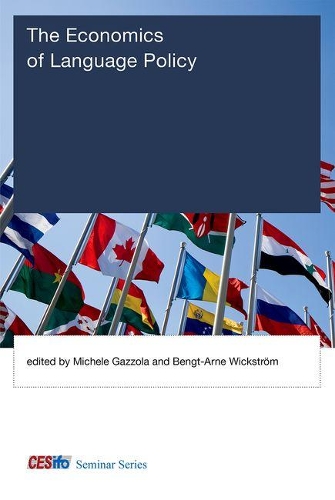
The Economics of Language Policy
(Hardback)
Publishing Details
The Economics of Language Policy
By (Author) Michele Gazzola
Edited by Bengt-Arne Wickstrm
Contributions by Franois Grin
Contributions by Michele Gazzola
Contributions by Bengt-Arne Wickstrm
Contributions by Victor Ginsburgh
Contributions by Shlomo Weber
Contributions by Maxime Leblanc Desgagn
Contributions by Franois Vaillancourt
Contributions by Ramon Caminal
MIT Press Ltd
MIT Press
30th September 2016
United States
Classifications
Professional and Scholarly
Non Fiction
Sociolinguistics
306.449
Physical Properties
Hardback
520
Width 152mm, Height 229mm, Spine 33mm
Description
Insights from the application of economic theories and research methods to the management of linguistic diversity in an era of globalization.In an era of globalization, issues of language diversity have economic and political implications. Transnational labor mobility, trade, social inclusion of migrants, democracy in multilingual countries, and companies' international competitiveness all have a linguistic dimension; yet economists in general do not include language as a variable in their research. This volume demonstrates that the application of rigorous economic theories and research methods to issues of language policy yields valuable insights. The contributors offer both theoretical and empirical analyses of such topics as the impact of language diversity on economic outcomes, the distributive effects of policy regarding official languages, the individual welfare consequences of bilingualism, and the link between language and national identity. Their research is based on data from countries including Canada, India, Kazakhstan, and Indonesia and from the regions of Central America, Europe, and Sub-Saharan Africa. Theoretical models are explained intuitively for the nonspecialist. The relationships among linguistic variables, inequality, and the economy are approached from different perspectives, including economics, sociolinguistics, and political science. For this reason, the book offers a substantive contribution to interdisciplinary work on languages in societyand language policy,proposing a common framework for a shared research area. Contributors Alisher Aldashev, Katalin Buzasi, Ramon Caminal, Alexander M. Danzer, Maxime Leblanc Desgagne, Peter H. Egger, Ainhoa Aparicio Fenoll, Michele Gazzola, Victor Ginsburgh, Gilles Grenier, Fran ois Grin, Zoe Kuehn, Andrea Lassmann, Stephen May, Serge Nadeau, Suzanne Romaine, Selma K. Sonntag, Stefan Sperlich, Jose-Ram n Uriarte, Fran ois Vaillancourt, Shlomo Weber, Bengt-Arne Wickstr m, Lauren Zentz
Author Bio
Michele Gazzola is a Research Fellow at Humboldt-Universit tzuBerlin. Bengt-Arne Wickstr m was until his retirement Director of the Institute for Public Economics at Humboldt-Universit tzuBerlin and is now Herder Professor at Andrassy-Universit t Budapest. Michele Gazzola is a Research Fellow at Humboldt-Universit tzuBerlin. Bengt-Arne Wickstr m was until his retirement Director of the Institute for Public Economics at Humboldt-Universit tzuBerlin and is now Herder Professor at Andrassy-Universit t Budapest. Victor Ginsburgh is Professor of Economics at the Universite Libre de Bruxelles and at the Center for Operations Research and Econometrics (CORE) at the Universite Catholique de Louvain. Michiel Keyzer is Professor of Economics and Director of the Centre for World Food Studies at Vrije Universiteit in Amsterdam.
